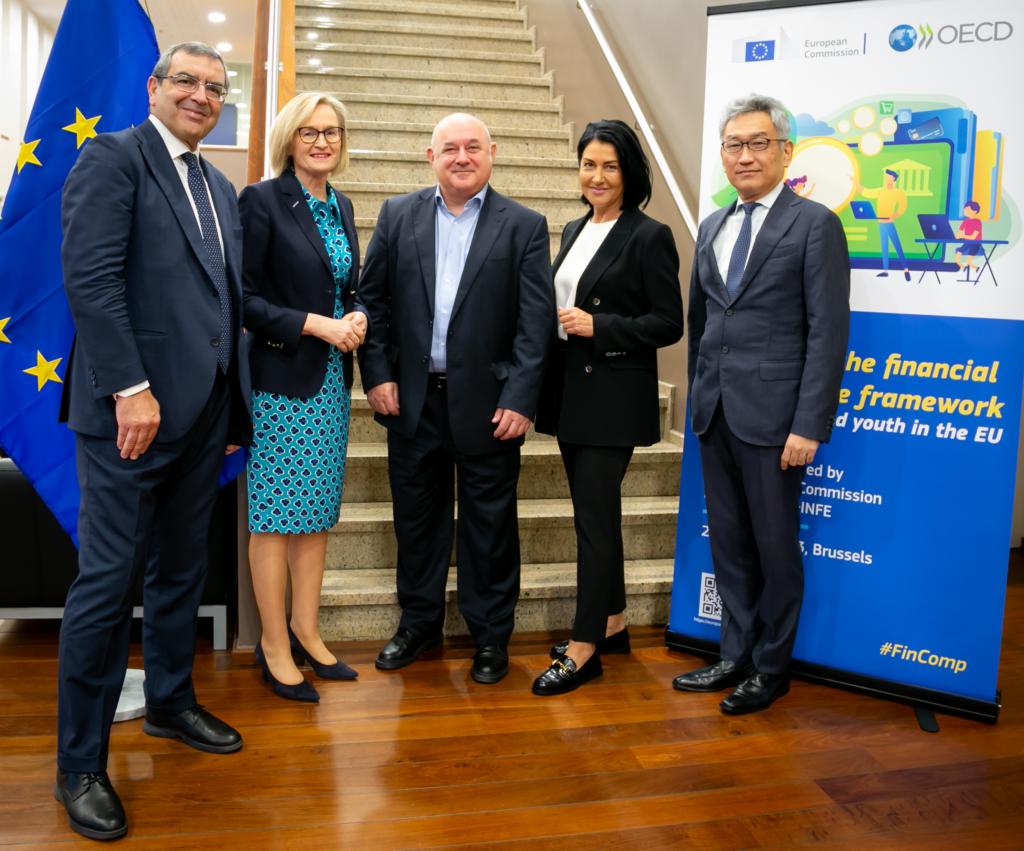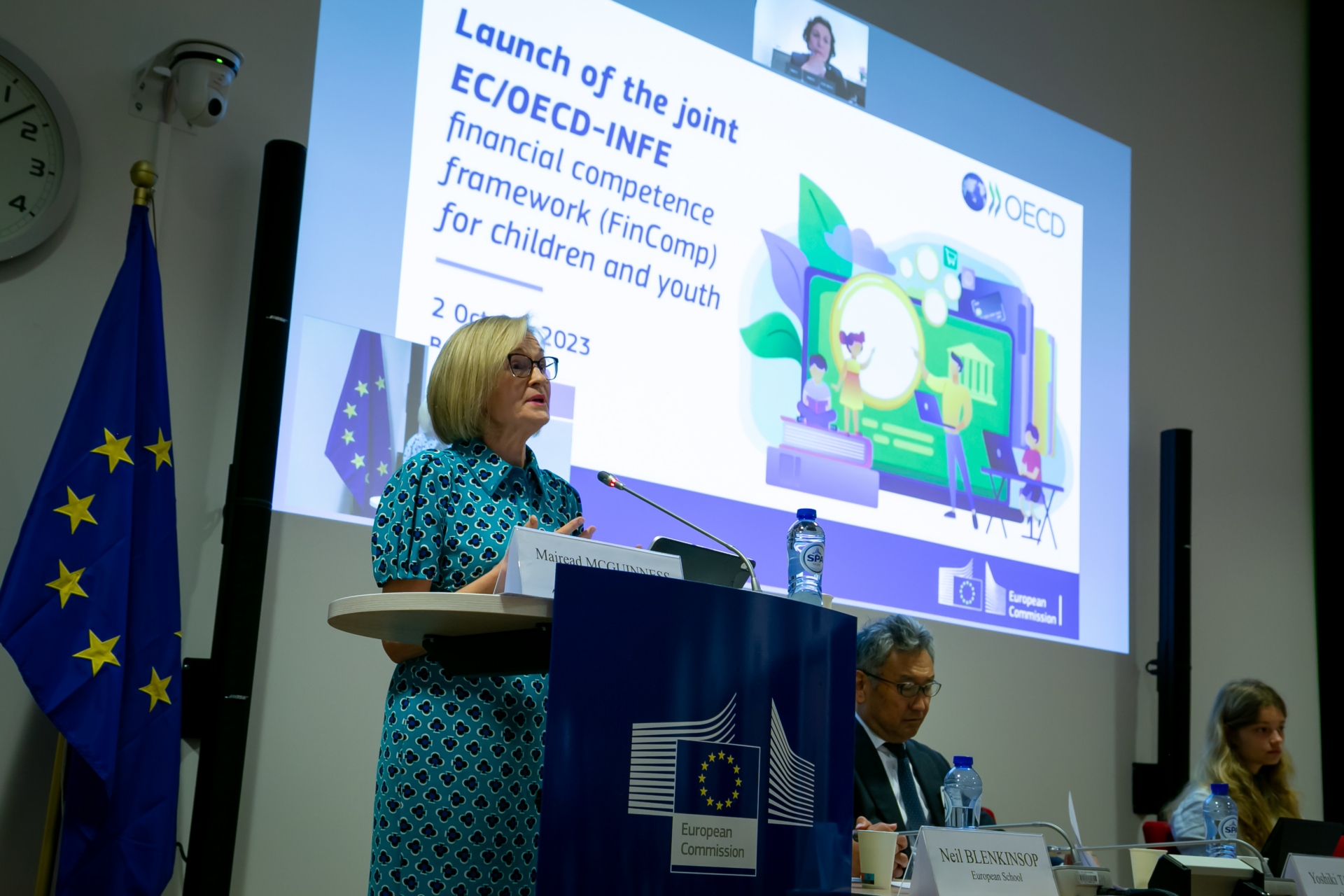This remarkable event brought together around one table experts, EU decision makers, academia and students. The Czepczyński Family Foundation from Poland was invited to speak about their experience with financial education for children.
Commissioner Mairead McGuinness, who is a great supporter and advocate of financial education, underlined, that financial education should start from an early age. Children and young people should be equipped with the know-how so that they can deal with money today and when they become adults. “Our relationship with money starts at a very young age and habits created when we are young stay with us throughout our lives. That’s why the framework is so important. It’s about equipping young people with the know-how so that they can have an informed and healthy relationship with money”, said Commissioner McGuinness.
Educating young children is the mission of the Czepczyński Family Foundation (CFF) from Poland, that has developed a financial education programme for children aged 5 to 10 years. “It is crucial to get to know the basics in order to be able to understand complex issues in the future”, argued Beata Stelmach, Advisor to the CFF board, who was speaking on the panel. “The ‘ABC of Economics’ programme is already present in more than 1700 schools in Poland as well in 200 education institutions abroad. It offers financial education adapted to childrens’ needs but also provides materials and trainings for teachers”.

In the picture from the right: Yoshiki Takeuchi-OECD Deputy Secretary-General, Beata Stelmach-Advisor to the Czepczynski Family Foundation Board, Manuel Bordoy-Deputy Secretary General, Office of the Secretary General of the European Schools, Mairead McGuinness-EU Commisisoner, Carmine Di Noia-Director for Financial and Enterprise Affairs, OECD
The level of financial literacy among European youth is still low
According to the European Commission “the need to improve financial literacy in the EU is as relevant as ever, as demonstrated by the recent 2023 Eurobarometer survey on financial literacy. That study confirmed, that the overall levels of financial literacy in the EU remain alarmingly low. It also showed, that in general young people tend to have lower financial knowledge and have less prudent financial behaviour, than older people”. The OECD Deputy Secretary-General Yoshiki Takeuchi also underlined, that bad habits are often developed at young age, and it is extremely difficult to eliminate them in the future.
Common competence framework to improve financial literacy
This is why the European Commission together with OECD have developed a common financial competence framework for children and youth. The aim was to help improve financial literacy of young people so that they are prepared to take well-informed personal finance decisions today and in the future.
The common framework contains a list of essential financial literacy skills, that children between 6 and 10 years and young people up to the age of 18 should acquire. It can therefore support the development of financial education policies, programmes and teaching materials. According to Beata Stelmach from Czepczyński Family Foundation “The common framework is a great reference point to develop new teaching materials but also to evaluate the existing ones. For example, the “ABC of Economics” programme covers 80% of skills, that, according to the framework, children up to the age of 10 should acquire. The Foundation has already started to adapt its materials so that they are fully in line with the framework”. Manuel Bordoy, representing the European Schools also confirmed, that their teaching programme will be evaluated against the framework. He happily announced, that many of the issues covered by the framework are already included in the education programme of European schools.
Participants of the panel were asked by the moderator Carmine Di Noia, Director for Financial and Enterprise Affairs at OECD, about what the Commission and OECD can do in order to facilitate the uptake of the strategy. According to Annamaria Lusardi from Stanford Institute for Economic Policy Research and Graduate School Of Business, it would be very useful if the application of this framework is binding for Member States, as currently some perform better than others. Beata Stelmach, Advisor to CFF board, underlined the need for appropriate financing. In the future the Commission could make it easier to apply for European funds in order to implement financial education at schools. She shared a good practice from the Greater Poland region, where 1000 schools, through funding by the EU, have access to the “ABC of Economics” programme.
By Margareta Przybyla, International Cooperation and Partnership Coordinator at Czepczyński Family Foundation (CFF)
Contact the author: margareta.przybyla@cff.edu.pl

